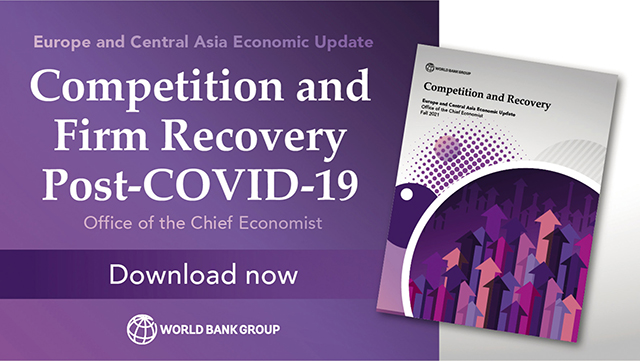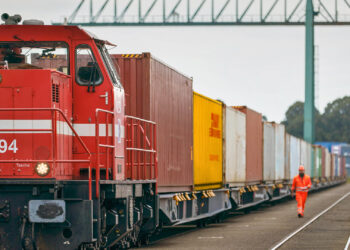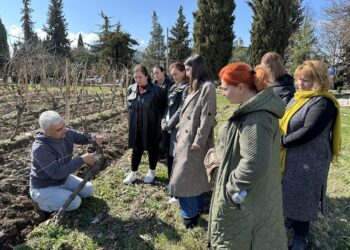A surprisingly strong rebound in the first half of this year boosted economic activity in emerging markets and developing countries in the Europe and Central Asia region, with the regional economy now projected to expand by a better-than-expected 5.5% in 2021, says the latest edition of the World Bank’s Economic Update for the region.
The rebound was largely driven by a strong recovery in exports during the first half of this year, as activity in the Euro area bounced back and commodity prices rose sharply, as well as strengthening domestic demand due to vaccinations and support packages. The boost to exports, however, may be fading going forward due to the ongoing global and regional spread of more contagious COVID-19 variants, which has also dampened the recovery in regional domestic demand.
Among the subregions of Europe and Central Asia, the South Caucasus suffered the sharpest collapse in output in 2020, contracting more than 5%. Output in the South Caucasus, boosted by the recovery in consumption and a strong pick-up in exports, is projected to rebound sharply in 2021, expanding 5.8%, with Georgia leading the region this year with a projected rebound of 8%. Georgia’s recovery is expected to edge down to 5.5% in 2022 and 5% in 2023, as macroeconomic support continues to be removed.
“The South Caucasus countries, and Georgia in particular, are seeing a robust recovery from the shocks of 2020, supported by pick-up in domestic demand and recovery among external partners,” said Sebastian Molineus, World Bank Regional Director for the South Caucasus. “However, amid rising inflation and slowly recovering labor market outcomes, increasing the pace of vaccination remains a critical priority. Beyond this, a sustainable recovery will be one that is green, resilient, and inclusive. Reforming State-owned Enterprises, improving human capital, and promoting innovation and digital transformation can improve productivity, while rebuilding economic buffers and preparing for the impact of climate change will make growth resilient.”
In 2022, regional growth in Europe and Central Asia is forecast to moderate to 3.4%, as external and domestic demand stabilize, and pandemic stimulus is withdrawn. The outlook remains highly uncertain given the continuation of the pandemic, especially in the context of unequal vaccine access and hesitancy. The regional recovery has been accompanied by a rapid acceleration of inflation and remains vulnerable to financial stress, which could be triggered by an abrupt tightening of external financing conditions or a sharp rise in policy uncertainty and geopolitical tensions.
A special analysis on ‘Competition and Firm Recovery Post-COVID-19’, using data from World Bank Enterprise Surveys and Business Pulse Surveys, finds that the pandemic had a profound and varied impact on firms. On average, firms in the region saw significant drops in monthly sales and number of full-time employees. By May this year, one in four firms anticipated falling into arrears on outstanding liabilities in the next six months. Smaller, younger, and female-run businesses had not yet seen their sales improve since the initial drop.
Crises can be devastating for many firms, but they often have a silver lining, reallocating resources from less productive to more productive firms. There is also evidence of this in Europe and Central Asia, particularly in countries with more competitive markets. Indeed, firms with high pre-crisis labor productivity experienced significantly smaller drops in sales and employment than firms with low pre-crisis labor productivity. More productive firms were also more likely to adapt to the crisis by increasing online activity and remote work.
“The role of competition is important because it is associated with dynamism, incentivizes firms to innovate, forcing more efficient firms to enter and grow, while facilitating the exit of less efficient ones,” said Asli Demirgüç-Kunt, World Bank Chief Economist for Europe and Central Asia. “In countries with more competitive markets and stronger policies that protect competition, this reallocation towards more productive firms was even greater.”
As economies enter the economic recovery phase, it will be important for policymakers in all countries to phase out broad policy support measures as soon as appropriate and focus on fostering a competitive business environment which is key to a strong recovery; resilience to future crises; and sustainable, long-term economic growth.
Fast Recovery Underway in Georgia as Strong Rebound Boosts Economies in Emerging Europe and Central Asia
Recommended
Highlights
Trending
Experience Seamless Connectivity with Silknet eSIM in Georgia
Why Silknet's eSIM could be your top choice in Georgia Since its introduction, eSIM technology has become...














